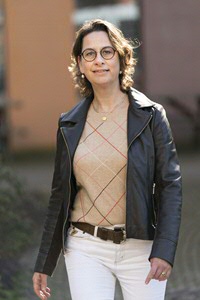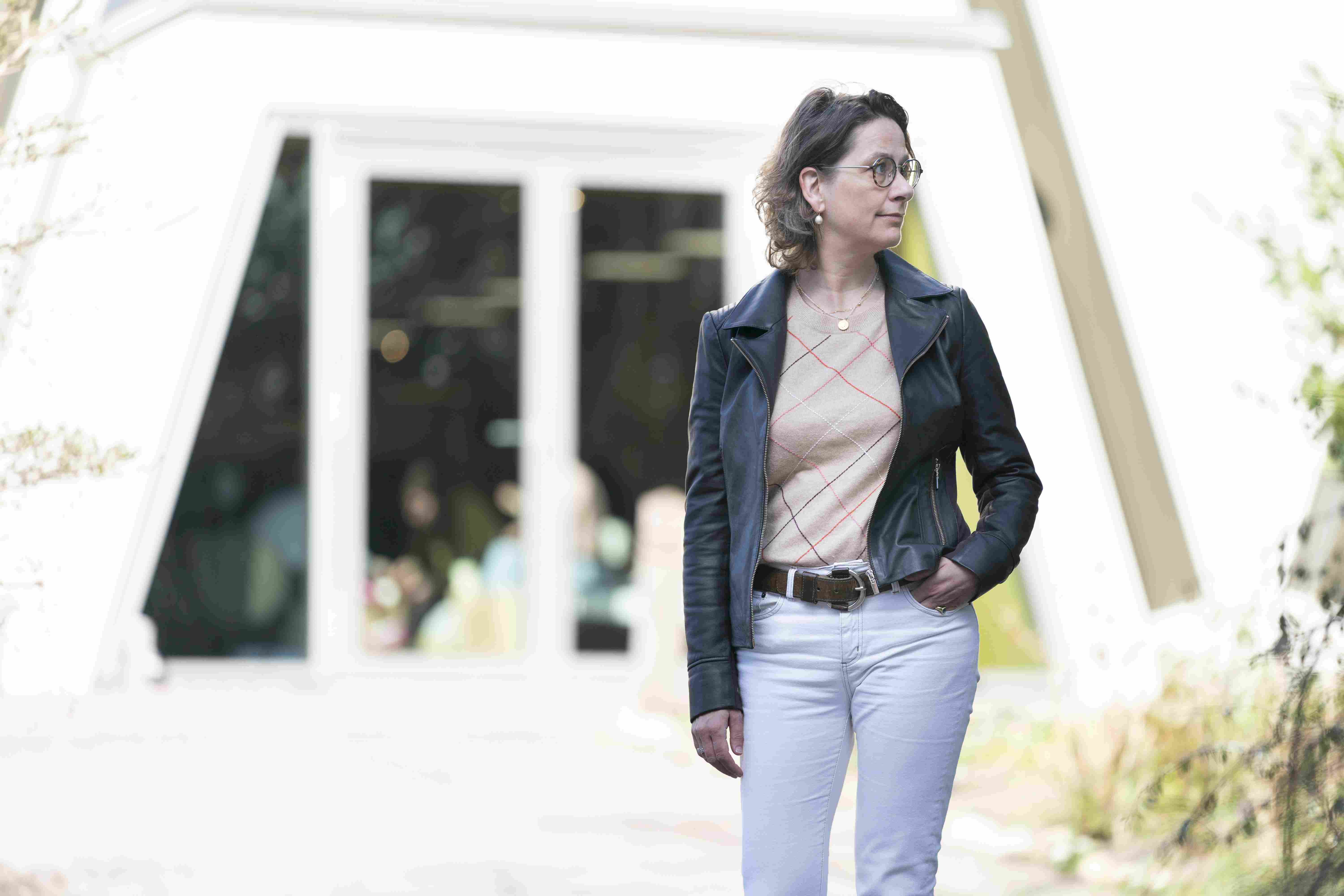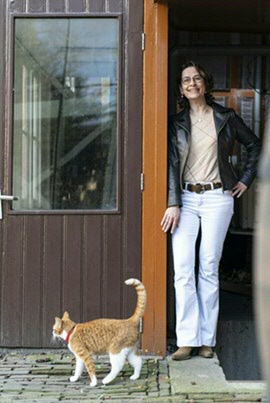Hoe migratie, families en levenslopen met elkaar samenhangen
Helga de Valk is al sinds haar studietijd geïnteresseerd in de levenslopen van jongeren. In de loop der jaren breidde die belangstelling zich uit naar hoe migratie, families en levenslopen met elkaar samenhangen. Ze is nu hoogleraar Migratie en levensloop en directeur van het Nederlands Interdisciplinair Demografisch Instituut (NIDI).

Je bent honorair hoogleraar Migratie en de levensloop aan de RUG. Waar hou je je mee bezig?
In mijn onderzoek ben ik vooral geïnteresseerd in hoe migratie, families en levenslopen met elkaar samenhangen. Mijn focus is daarbij in het bijzonder op de levenslopen van jongeren met een migratieachtergrond. In een lopend project kijk ik bijvoorbeeld hoe verhuizingen in de kindertijd van invloed zijn op latere levensuitkomsten. Daarbij vergelijken we jongeren met en zonder migratie achtergrond in verschillende Europese landen. Dit doen we door gebruik te maken van grootschalige survey en register data. Ik begeleid een tiental promovendi en postdocs maar ook BA en MA studenten bij hun onderzoek. Het doorgeven van kennis aan de volgende generatie getalenteerde jonge mensen is bijzonder en mooi om te doen!
Waar komt je interesse voor dit vakgebied vandaan?
Eigenlijk heb ik me vanaf mijn studie sociologie en pedagogiek altijd geïnteresseerd voor jongeren en hun levensloop. Ik vind het fascinerend om meer te weten over de achtergronden van verschillende levenslopen en hoe ervaringen in de jeugd die vormen. Maar ook hoe deze voor verschillende groepen jongeren anders uitwerken. Uiteindelijk gaat het steeds om de vraag hoe kansenongelijkheid ontstaat, in stand blijft of juist kan verminderen. Migratie en de effecten ervan voor de persoon en samenleving intrigeerden mij, misschien ook omdat ik zelf vanaf mijn studietijd op verschillende plekken in de wereld heb gewoond. Juist daar leer je het meest over jezelf en over de context waar je vandaan komt. Tegelijkertijd begrijp je ook beter wat het verhuizen met jezelf en bijvoorbeeld familiebanden doet.
Wat verstaan we onder levensloop, en wat zijn bijvoorbeeld veranderingen in de laatste decennia?
De levensloop is eigenlijk een concept wat direct raakt aan demografie: het gaat over alles wat een mens meemaakt in het leven van geboorte tot sterfte. Daarbij is het niet alleen het individu maar juist ook de interactie met de omgeving en de belangrijke andere in het leven van de persoon die invloed hebben op de keuzes die in het leven gemaakt worden. Die keuzes kunnen over van alles gaan, van het aangaan van een partnerrelatie, tot het krijgen van kinderen, taakverdeling in het huishouden alsook levensstijl en gezondheid. Levenslopen zijn ingebed in een bepaalde plaats en tijd wat maakt dat als je historisch kijkt er veranderingen zijn, maar ook dat levens anders verlopen in verschillende delen van de wereld. In Europa zien we bijvoorbeeld een uitstel van het aangaan van partnerrelaties en krijgen van kinderen. Interessant is dat ook jongeren met een migratie achtergrond in bijvoorbeeld Nederland dit soort keuzes steeds meer uitstellen.

Naast hoogleraar aan de RUG ben je sinds 2020 ook directeur van het Nederlands Interdisciplinair Demografisch Instituut (NIDI). Kun je iets vertellen over dit instituut?
Het NIDI is het nationale demografisch instituut waar alle kennis en kunde op dit vakgebied samenkomt in Nederland. Het instituut bestaat al meer dan 50 jaar en is sinds 2003 aangesloten bij de Koninklijke Nederlandse Academie van Wetenschappen (KNAW). Sinds 2014 zijn we ook geaffilieerd met de RUG. Excellent onderzoek naar bevolkingsontwikkeling in Nederland en Europa (maar soms ook de wereld) staat bij ons voorop. Daarnaast stellen we ons tot doel om kennis uit dit onderzoek te delen met de samenleving en beleid. Ons pand staat in Den Haag dichtbij het Binnenhof waar we met ongeveer 50 onderzoekers werken. Kennis die we opdoen in grote wetenschappelijke (internationaal vergelijkende) projecten gefinancierd vanuit NWO of Europa (Horizon Europe en ERC bijvoorbeeld) vertalen we op verschillende manieren zoals bijvoorbeeld in ons populairwetenschappelijk magazine Demos. Het NIDI heeft verder een belangrijke rol in de data-infrastructuur in Nederland en daarbuiten via bijvoorbeeld de Gender and Generations Program. We zijn verder stevig verankerd in de Europese demografie en hebben met een aantal kernspelers het netwerk Population Europe opgericht maar zijn ook penvoerder van de Europese beroepsvereniging (EAPS). Ik heb de eer om daar op dit moment ook president van te zijn.
Het NIDI is geaffilieerd met de Rijksuniversiteit Groningen. Wat betekent dit?
Deze samenwerking is een prachtige manier om ons instituut te verbinden en verder te verankeren met de universiteit. Door de samenwerking is ons onderzoek integraal deel van de RUG en promoveert het merendeel van de huidige 40 PhD studenten ook bij deze universiteit. Een deel van de NIDI-onderzoekers is net als ik hoogleraar bij de RUG. Gezien het interdisciplinaire karakter van ons onderzoek is dit aangehaakt bij verschillende faculteiten, van Ruimtelijke wetenschappen tot Gedrags- en Maatschappijwetenschappen en UMCG. We waren al aangehaakt bij facultair overstijgende activiteiten maar zijn ook nu actief betrokken bij de schools die ontwikkeld worden zoals de Aletta Jacobs School en de Rudolf Agricola School. We leveren daarnaast een bijdrage aan onderzoeksgestuurd onderwijs en bieden een plek voor stages en afstuderen van RUG-studenten. De RUG heeft daarmee een ‘huis’ in Den Haag waar een speciale RUG-kamer en onze vergaderfaciliteiten ter beschikking staan voor de universiteit.

Welke rol speelt het NIDI bij bijvoorbeeld beleid van de landelijke overheid of andere organisaties?
Het NIDI is van oudsher verbonden met beleid. Het NIDI-onderzoek was in het verleden vaak in opdracht van de overheid (zowel nationaal als Europees). Dat is inmiddels sterk veranderd door veranderingen in financiering maar nog steeds staat het NIDI-onderzoek dichtbij beleid. Vorig jaar nog hebben we de Rapportage Bevolking 2050 afgerond die door het NIDI gecoördineerd werd op vraag van de Tweede Kamer en het Ministerie van SZW. Dit onderzoek heeft grote belangstelling getrokken ook in de media en is bij een reeks aan ministeries op het hoogste ambtelijke niveau gepresenteerd. Met regelmaat worden NIDI-onderzoekers ook gevraagd vanwege hun expertise op te treden bij Tweede Kamercommissies. Verder heeft het instituut sterke banden met verschillende kennisinstellingen die raken aan de demografie, zoals het Planbureau voor de Leefomgeving (PBL). Diverse collega’s zitten in adviesraden van deze instanties en worden geconsulteerd als het gaat om zowel onderzoek als beleidsadvies. Ikzelf ben lid van de Adviesraad Migratie die regering en parlement adviseert over migratievraagstukken. Op deze manieren voedt het NIDI het beleid op verschillende niveaus.
Wat is de meerwaarde van de combinatie van je beide aanstellingen?
Het mooie van de verschillende rollen die ik mag hebben is dat je kunt fungeren als bruggenbouwer: tussen disciplines, onderzoek en onderwijs, wetenschappers in verschillende stadia van hun carrière, onderzoek en beleid, en onderzoeksinstituten en universiteit. Die combinatie is uniek en creëert prachtige dwarsverbanden. Dit levert uitwisselingen op die meer zijn dan de som der delen. Ik heb nog veel plannen binnen de samenwerking die we de komende jaren hopelijk gezamenlijk verder vorm kunnen gaan geven!
Meer nieuws
-
01 december 2025
De kracht van beweging
